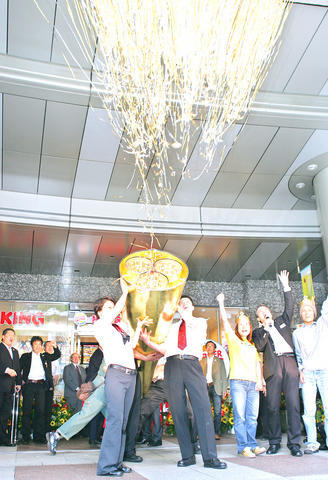Burger King and its famous Whopper hamburger returned to Japan yesterday after a six-year hiatus and customers who lined up for hours at the first new branch needed no translation to realize that the English word "whopper" means "outlandishly huge."
"It feels more like you're eating a burger," said Shinichi Fujiki, 37, who wore a paper crown as one of the first 100 customers at the Tokyo restaurant's opening.
Many hamburgers sold here are small, with thin slices of meat.

PHOTO: AP
Fujiki frequented Burger King when it was in Japan in the 1990s and said he'd missed it since it was forced to withdraw in 2001, partly due to a bitter price war with McDonald's.
McDonald's is still Burger King's biggest rival in Japan, with 3,800 restaurants.
A second Tokyo Burger King is set to open later this month and more may follow.
Burger King Corp, the world's second-largest fast-food hamburger company, is not changing any of its sandwich sizes or most other basic menu features for the Japanese market, but it does offer a teriyaki Whopper.
High-calorie meals
The ¥370 (US$3.05) Whopper and the even more expensive ¥600 Double Whopper with cheese and bacon are expected to fare better this time around because of a new trend among Japanese to favor pricier, high-calorie meals.
McDonald's ¥350 MegaMac, with four beef patties, has proved a hit.
The first store Krispy Kreme Doughnuts Inc opened in Japan in December is still drawing long lines.
Miami-based Burger King is banking on the recent hunger here for greasy and sweet food and a move away from the healthy, traditional diet that is centered on fish and rice.
`Important market'
"Japan is a very important market for us and one that we have great growth plans for in the future," said Burger King chief executive John Chidsey, who was in Tokyo for the countdown ceremony where a jazz band played.
A giant firecracker went off and glittery streamers filled the air as the doors opened.
Regional menus are one of Burger King's main features.
They include the Korean barbecue Bulgogi Burger and Green Tea Pie in Thailand.
For Japan, it's the ¥390 Whopper Teriyaki, a 13cm, 113g beef patty cooked in a sweet, spicy sauce and served on a sesame-seed bun with lettuce and tomato.
The US chain will not be serving US beef in Japan, but will be using meat from New Zealand instead. McDonald's serves only Australian beef in Japan.
Peter Tan, president of Burger King Asia Pacific, said that the decision to go with New Zealand beef was an economic one and that the company chooses different kinds of beef depending on the stores' locations.
`Different beefs'
"We use different beefs around the world," he said. "It really doesn't matter where the beef comes from."
The return to Japan is part of Burger King's global expansion efforts.
The chain -- which runs more than 11,000 restaurants worldwide, including Europe and Latin America -- is opening its first stores this year in Egypt, Hong Kong and Poland as well.

Authorities have detained three former Taiwan Semiconductor Manufacturing Co (TMSC, 台積電) employees on suspicion of compromising classified technology used in making 2-nanometer chips, the Taiwan High Prosecutors’ Office said yesterday. Prosecutors are holding a former TSMC engineer surnamed Chen (陳) and two recently sacked TSMC engineers, including one person surnamed Wu (吳) in detention with restricted communication, following an investigation launched on July 25, a statement said. The announcement came a day after Nikkei Asia reported on the technology theft in an exclusive story, saying TSMC had fired two workers for contravening data rules on advanced chipmaking technology. Two-nanometer wafers are the most

DEFENSE: The first set of three NASAMS that were previously purchased is expected to be delivered by the end of this year and deployed near the capital, sources said Taiwan plans to procure 28 more sets of M-142 High Mobility Artillery Rocket Systems (HIMARS), as well as nine additional sets of National Advanced Surface-to-Air Missile Systems (NASAMS), military sources said yesterday. Taiwan had previously purchased 29 HIMARS launchers from the US and received the first 11 last year. Once the planned purchases are completed and delivered, Taiwan would have 57 sets of HIMARS. The army has also increased the number of MGM-140 Army Tactical Missile Systems (ATACMS) purchased from 64 to 84, the sources added. Each HIMARS launch pod can carry six Guided Multiple Launch Rocket Systems, capable of

CHINA’s BULLYING: The former British prime minister said that he believes ‘Taiwan can and will’ protect its freedom and democracy, as its people are lovers of liberty Former British prime minister Boris Johnson yesterday said Western nations should have the courage to stand with and deepen their economic partnerships with Taiwan in the face of China’s intensified pressure. He made the remarks at the ninth Ketagalan Forum: 2025 Indo-Pacific Security Dialogue hosted by the Ministry of Foreign Affairs and the Prospect Foundation in Taipei. Johnson, who is visiting Taiwan for the first time, said he had seen Taiwan’s coastline on a screen on his indoor bicycle, but wanted to learn more about the nation, including its artificial intelligence (AI) development, the key technology of the 21st century. Calling himself an

South Korea yesterday said that it was removing loudspeakers used to blare K-pop and news reports to North Korea, as the new administration in Seoul tries to ease tensions with its bellicose neighbor. The nations, still technically at war, had already halted propaganda broadcasts along the demilitarized zone, Seoul’s military said in June after the election of South Korean President Lee Jae-myung. It said in June that Pyongyang stopped transmitting bizarre, unsettling noises along the border that had become a major nuisance for South Korean residents, a day after South Korea’s loudspeakers fell silent. “Starting today, the military has begun removing the loudspeakers,”